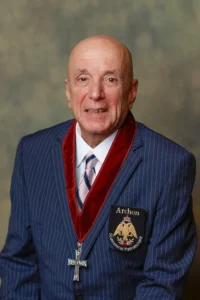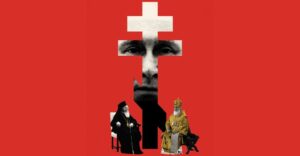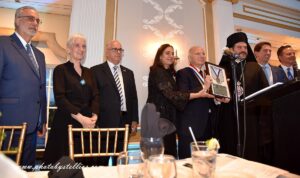His All Holiness Ecumenical Patriarch Bartholomew addressed a Vatican delegation representing Pope Benedict XVI at the Thronal Feast of the Ecumenical Patriarchate on November 30, 2008.
The delegation, led by Cardinal Walter Kasper, president of the Pontifical Council for Promoting Christian Unity, also delivered greetings to His All Holiness on behalf of Pope Benedict.
Ecumenical Patriarch’s greeting on the feast of St. Andrew the First Called can be read below:
Your Eminence Cardinal Walter Kasper
Representative of His Holiness Pope Benedict
The Sixteenth, Bishop of Rome
Along with your esteemed entourage
With much joy and jubilation in the Lord we welcome your presence and participation in the annual celebration of the memory of the glorious Saint Andrew the First Called Disciple, founder of our Holy Church of Constantinople. From our heart we thank our very beloved brother Pope Benedict, the head of the Church in Rome, because he was well disposed to send you here, as the bearer of his brotherly message of feelings of love and honor. These feelings we also return from our hearts, wishing him and the holy sister Church of Rome every blessing and grace from God.
Decades ago, a holy practice was established encouraging the visitation of the representatives of our Churches at each other’s thronal feasts. The ever-memorable heads of our Churches, Patriarch Athenagoras and Pope Paul VI established the first event. It was animated by the living desire that our Churches which had been separated for a whole millennium and, occasionally, found themselves at opposing positions that were not beneficial, finally came into a period of a dialogue of love and truth. This dialogue would have as its end the full restoration of complete unity, just as in the first millennium after Christ.
Today, those who have been entrusted by the mercy of God with the leadership of our Churches possess this same deep desire to continue this bi-lateral dialogue of love and truth, entrusting the results to the All Holy Spirit, Who leads to “All truth” (John 16:3) and to God Who multiplies our seed (1 Cor. 3:6-7).
Continuing to observe vigilantly from this sacred Center the course of this double dialogue, we rejoice in its continuation and progress. For on the one hand the dialogue of love cleanses our relations from every proselytistic or other activity contradicting the spirit of mutual respect and love, while on the other hand the dialogue of truth, entrusted to the Mixed International Committee, continues its difficult and painful task under the co-presidency of your beloved Eminence, for which we congratulate and thank you.
In today’s reading of the Holy Gospel of John during the celebration of the Divine Liturgy, we heard how strong the bond was between the Lord and the brothers Andrew and Peter. Since Andrew with an other disciple, most probably John, spent a whole day conversing and remaining with the Lord in his lodgings- what a great privilege indeed! -Andrew hastens and announces to Peter that we have found the Messiah and presents him to the Lord. This scene is indeed moving and of decisive importance for those things which would take place in the future. Peter and Andrew, brothers according to the flesh, at that moment also became brothers in Christ, united not only with Him, but also with one another, by imperishable bonds.
After the Ascension of the Lord into the heavens, and the descent of the Holy Spirit on the day of Pentecost, the two Apostles went out evangelizing the peoples, being witnesses of the Resurrected Christ. Peter went as far as Rome, sanctifying the Church there through his blood, and Andrew came, according to the ancient tradition, to Byzantium, founding the Church in that place, which would later, by divine providence, become the New Rome, the City of Constantine. Thus, the two brothers, Peter and Andrew, while they may have followed a separate geographical path in bearing witness to the Gospel, they remained united in history through the bond of our two Churches, Rome and Constantinople.
This union between the two apostles, which started as a biological bond, in order for it to become a spiritual bond in the Lord himself, and concluded as a bond of our Churches, we are called to unceasingly have in mind as we proceed toward the restoration of the full union of our Churches. Today, honoring the Apostle Andrew, we also honor his brother Peter, and just as it is not possible for Peter and Andrew to be thought of separately from one another, it is not proper that the Churches of Rome and Constantinople should continue journeying in division.
We are therefore obligated to remove from our midst the thorns, which have accumulated for a millennium, in the relationships of our Churches in matters of faith as well as in issues touching upon the structure and the government of the Church. In this matter, we have as a most valuable guide our common tradition of the Seven Ecumenical Councils and the first millennium after Christ, from which we will draw out the basic beliefs and criteria in order to remove the things that the millennium of our separation from one another contributed to the accentuation of the distance between us.
To this, we are not only called as we said earlier, out of respect to the sacred memory of the two first called apostles from whom our Churches draw their very being, but also from our responsibility to the contemporary world which is shaken by a variety of conflicts and has an urgent need of the message of reconciliation brought by the Founder of the Church through His Cross and Resurrection. It is evident that if this message it is not respected by us Christians, its influence upon contemporary man shall remain difficult. The Church must always be in the position to repeat to everyone the words of Phillip to Nathaniel, which we heard in today’s Gospel passage: “come and see” (John 1:47). Only then will her message be convincing when she is able to give first herself the example of reconciliation and love.
In this spirit, and with these thoughts and feelings, we greet again in our midst the presence of the venerable delegation of the elder sister Church of Rome and His Holiness, her head, our beloved brother Pope Benedict, asking the Lord to bless and direct the course of our Churches to the fulfillment of His holy will.
Amen.








